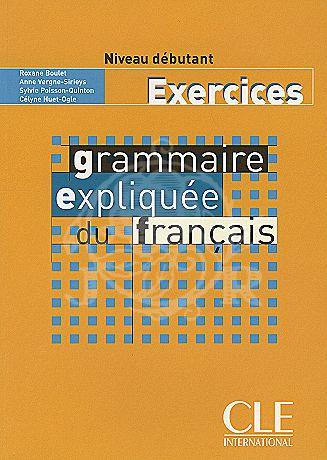- Home
- CLE International
- Grammaire Expliquée Du Français - Niveau Débutant - Exercices
Grammaire Expliquée Du Français - Niveau Débutant - Exercices
- Author : Sylvie Poisson-Quinton, C. Huet-Ogle, Roxane Boulet, Anne Vergne-Sirieys
- Binding : Paperback
- ISBN-10 : 2090337087
- ISBN-13 : 9782090337082
- Language : French
- Market : Adolescent/Adult
- Pages: 192
- Publisher : Clé international
- Publishing Date : October 8,2003
- Series : Expliquée du français
- Size : 19.7 x 1.2 x 27.6 cm
- Subtitle : Grammaire expliquée du français
- Subject : French
- Weight : 408 G
Grammar activity book in French as a foreign language (FLE), in the Explained collection , for older adolescents and adults, beginner level.
The grammar explained in French for beginners was designed with an emphasis on "readability". It uses a minimum of metalanguage but, to illustrate the grammatical explanations, it offers many examples taken from everyday life, drawings allowing to visualize a particular grammatical fact, diagrams and summary tables.
This grammar is intended for beginners, adolescents or adults. It will accompany them from their first weeks of learning French, whether the teacher uses it in addition to the usual textbook, or uses it as a resource document at home.
A first part Grammatical Tools conventionally deals, in very simple terms and always starting from examples, with the different parts of speech: the noun, what precedes it (the articles), what completes it (the complements of the noun, the adjectives ), which replaces it (the pronouns); the verb, the main tenses of the indicative, the most frequent occurrences of the subjunctive and the conditional, the impersonal forms, the use of the passive, the construction of verbs; invariable words (prepositions and adverbs); the negative, interrogative, exclamative sentence.
A second part How to express ...? refers more to a notional-functional approach. It allows beginner learners to quickly get by in the various communication situations they encounter: how to locate themselves in time and space, how to suggest something, accept or refuse a proposal, express a doubt or a restriction. , formulate a wish ... Here again, each fact of language is always put into situation, either by a sentence or a small dialogue, or by a drawing.

+919650597000
Call us on

goyalshopify@gmail.com
write to us on

+919650597009
Whats'App Enquire & Order










